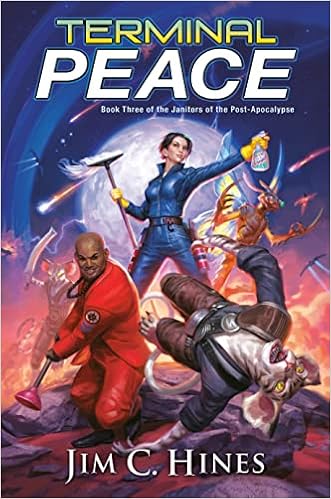 Terminal Peace is the third book in the Janitors of the Post-Apocalypse trilogy by Jim C. Hines. I’d like to tackle this review in two parts: firstly, all the excellent aspects such as character, worldbuilding, plot, and so on. And secondly, the excellent moral questions and themes buried in between all those things.
Terminal Peace is the third book in the Janitors of the Post-Apocalypse trilogy by Jim C. Hines. I’d like to tackle this review in two parts: firstly, all the excellent aspects such as character, worldbuilding, plot, and so on. And secondly, the excellent moral questions and themes buried in between all those things.
Let’s start with the premise: Captain Marion “Mops” Adamopoulos and her intrepid crew of former janitors and assorted companions are on a quest to prevent the interstellar Alliance from going even more to war. The concept is wacky, but surprisingly strong: a kind of literary “Galaxy Quest,” except here, not even the aliens believe Mops and Co. can save the day.
The characters are, in a word, delightful. Mops is tough, smart, sensitive, and determined, and on page 5 we learn that she is terminally ill. It is a bit more complicated than that–there was a plague that turned humanity “feral” after First Contact brought an alien pathogen to Earth about a century ago. There’s a treatment now, but Mops’ body is rejecting it. So she won’t die, but her mind will be gone.
Along with Mops, we have the Prodryan, Advocate of Violence (Cate for short), whose people are determined to wipe out every other species they encounter; Gabe, who brings knowledge of Earth’s cultural history (am I excited for the 2048 “Charlie and the Chocolate Factory” starring Zendaya as Wonka? Yes. Yes, I am.); Kumar, whose knowledge of cleaning solvents leads to several thrilling and hilarious victories when he leads a mission on the planet Tuxatl; and many others.

Speaking of Tuxatl, are you looking for some fantastically creative aliens and planets? You’re in the right universe. Facing off against the Prodryans and making up the major players in the unstable Alliance are the Krakau, Rokkau, Tjikko, and Quetzalus. (Humans don’t really count for aforementioned plague reasons.) Joining the party are Tuxatl natives the Jynx, a lemur-like species whose fluffy tails and big eyes conceal a lot more nefarious secrets than I suspected. They are at the heart of the plot: why do the Prodryans, famous throughout space for their blood/ichor/sap-thirst, fear them so terribly that they guard against anyone ever landing there? The process of finding that answer led to some serious ethical dilemmas, like: how far is it acceptable to go if your motive is self-defense? Should you change a person’s fundamental nature? How about that of a whole species?
All this leads us neatly to the matter of morals and themes. As previously mentioned, Mops begins the story with the revelation that she will soon revert to her feral state and live out the rest of her life as a mindless creature driven by hunger and rage. Despite this, she dedicates herself to the mission of preventing the war from growing worse, knowing she likely won’t see the conclusion. There are several points throughout the book where the outcome looks truly bleak, both on the war front and for Mops’ health. In fact, I took a break at the end of chapter 21 because I was starting to cry on the subway. ‘That’s it,’ I thought. ‘Jim C. Hines is uninvited from my birthday party.’ (To be clear, Jim C. Hines is not aware that I exist. If he reads this, it will be the first he hears of my birthday party. Nevertheless.)
But the fact is that despite the overwhelming unlikelihood of success, the effort Mops and the others put in never once feels pointless. And not in an ‘oh, it’s a book so of course they’ll succeed’ kind of way. Mops knows what is happening to her. The question of whether the determination she shows will pay off is a real one. But the determination, the effort, the trying still count. This feeling permeates the book in a sincerely comforting way. Hope takes work, and is always worth it. So with all due respect to Yoda, there is a try, and it matters very much. The fact that this emotional core comes from a very personal place, as is explained in the Author’s Note, only makes it hit harder.
So thank you for this book, Mr. Hines. I’m going to donate blood. And you’re invited to my birthday party.
Sophie is the deputy fiction editor of MetaStellar, and sometimes write book reviews too. She has her MFA from Emerson College and spends her free time reading and writing science fiction and fantasy. Her work can be found on MetaStellar, PageTurner, and on her website: https://sophiegorjance.wordpress.com/

